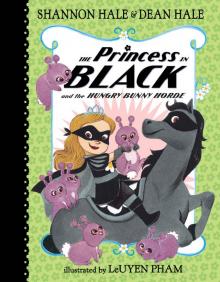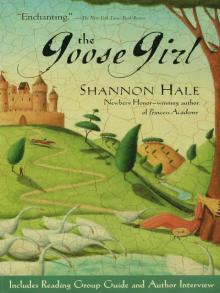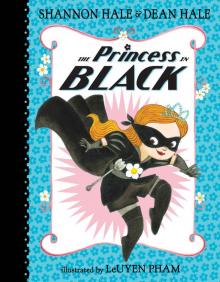- Home
- Shannon Hale
Princess Academy
Princess Academy Read online
.
Bloomsbury Publishing, London, Berlin and New York
First published in Great Britain in 2005 by Bloomsbury Publishing Plc
36 Soho Square, London, W1D 3QY
This electronic edition published in May 2010 by Bloomsbury Publishing Plc
Copyright © Shannon Hale 2004
The moral right of the author has been asserted
All rights reserved
You may not copy, distribute, transmit, reproduce or otherwise
make available this publication (or any part of it) in any form, or by any means
(including without limitation electronic, digital, optical, mechanical, photocopying,
printing, recording or otherwise), without the prior written permission of the
publisher. Any person who does any unauthorised act in relation to this publication
may be liable to criminal prosecution and civil claims for damages
A CIP catalogue record for this book is available from the British Library
ISBN 978 1 4088 1197 9
www.bloomsbury.com
Visit www.bloomsbury.com to find out more about our authors and their books
You will find extracts, author interviews, author events and you can sign up for
newsletters to be the first to hear about our latest releases and special offers
.
Also by Shannon Hale
.
.
THE BOOKS OF BAYERN
.
The Goose Girl
Enna Burning
River Secrets
.
.
Princess Academy
.
.
The Book of a Thousand Days
.
For Dean
.
Best Friend, Companion, & Squeeter Keeper
You are Home
n
Chapter One
The east says it’s dawn
My mouth speaks a yawn
My bed clings to me and begs me to stay
I hear a work song
Say winter is long
I peel myself up and then make away
n
Miri woke to the sleepy bleating of a goat. The world was as dark as eyes closed, but perhaps the goats could smell dawn seeping through the cracks in the house’s stone walls. Though still half-asleep, she was aware of the late autumn chill hovering just outside her blanket, and she wanted to curl up tighter and sleep like a bear through frost and night and day.
Then she remembered the traders, kicked off her blanket, and sat up. Her father believed today was the day their wagons would squeeze up the mountain pass and rumble into the village. This time of year, all the villagers felt the rush for the last trading of the season, to hurry and square off a few more linder blocks and make that much more to trade, that much more to eat during the snow-locked months. Miri longed to help.
Wincing at the rustle of her pea-shuck mattress, Miri stood and stepped carefully over her pa and older sister, Marda, asleep on their pallets. For a week she had harbored an anxious hope to run to the quarry today and be already at work when her pa arrived. Perhaps then he might not send her away.
She pulled her wool leggings and shirt over her sleep clothes, but she had not yet laced her first boot when a crunch of pea-shucks told her that someone else had awakened.
Pa stirred the hearth embers and added goat dung. The orange light brightened, pushing his huge shadow against the wall.
“Is it morning?” Marda leaned up on one arm and squinted at the firelight.
“Just for me,” said their father.
He looked to where Miri stood, frozen, one foot in a boot, her hands on the laces.
“No,” was all he said.
“Pa.” Miri stuffed her other foot in its boot and went to him, laces trailing on the dirt floor. She kept her voice casual, as though the idea had just occurred to her. “I thought that with the accidents and bad weather lately, you could use my help, just until the traders come.”
Pa did not say no again, but she could see by the concentrated way he pulled on his boots that he meant it. From outside wafted one of the chanting songs the workers sang as they walked to the quarry. I hear a work song say winter is long. The sound came closer, and with it an insistence that it was time to join in, hurry, hurry, before the workers passed by, before snow encased the mountain inside winter. The sound made Miri’s heart feel squeezed between two stones. It was a unifying song and one that she was not invited to join.
Embarrassed to have shown she wanted to go, Miri shrugged and said, “Oh well.” She grabbed the last onion from a barrel, cut off a slice of brown goat cheese, and handed the food to her father as he opened the door.
“Thank you, my flower. If the traders come today, make me proud.” He kissed the top of her head and was singing with the others before he reached them.
Her throat burned. She would make him proud.
Marda helped Miri do the inside chores—sweeping the hearth and banking the coals, laying the fresh goat dung out to dry, adding more water to the salt pork soaking for dinner. As Marda sang, Miri chattered about nothing, never mentioning their pa’s refusal to let her work. But gloom hung heavy on her like wet clothes, and she wanted to laugh and shake it off.
“Last week I was passing by Bena’s house,” said Miri, “and her ancient grandfather was sitting outside. I was watching him, amazed that he didn’t seem bothered by a fly that was buzzing around his face, when, smack. He squashed it right against his mouth.”
Marda cringed.
“But Marda, he left it there,” said Miri. “This dead fly stuck just under his nose. And when he saw me, he said, ‘Good evening, miss,’ and the fly . . .” Miri’s stomach cramped from trying to keep speaking through a laugh. “The fly wobbled when he moved his mouth . . . and . . . and just then its little crushed wing lifted straight up, as if it were waving hello to me, too!”
Marda always said she could not resist Miri’s low, throaty laugh and defied the mountain itself not to rumble as well. But Miri liked her sister’s laugh better than a belly full of soup. At the sound, her heart felt lighter.
They chased the goats out of the house and milked the nannies in the tight chill of morning. It was cold on top of their mountain in anticipation of winter, but the air was loosened by a breeze coming up from a valley. The sky changed from pink to yellow to blue with the rising sun, but Miri’s attention kept shifting to the west and the road from the lowlands.
“I’ve decided to trade with Enrik again,” said Miri, “and I’m set on wrestling something extra out of him. Wouldn’t that be a feat?”
Marda smiled, humming. Miri recognized the tune as one the quarry workers sang when dragging stones out of the pit. Singing helped them to tug in rhythm.
“Maybe extra barley or salt fish,” said Miri.
“Or honey,” said Marda.
“Even better.” Her mouth watered at the thought of hot sweet cakes, honeyed nuts for a holiday, and a bit saved to drizzle on biscuits some bleak winter evening.
At her pa’s request, Miri had taken charge of trading for the past three years. This year, she was determined to get that stingy lowlander trader to give up more than he had intended. She imagined the quiet smile on Pa’s face when she told him what she had done.
“I can’t help wondering,” said Marda, holding the head of a particularly grumpy goat while Miri did the m
ilking, “after you left, how long did the fly remain?”
At noon, Marda left to help in the quarry. Miri never spoke about this daily moment when Marda went and Miri stayed behind. She would never tell how small and ugly she felt. Let them all believe I don’t care, thought Miri. Because I don’t care. I don’t.
When Miri was eight years old, all the other children her age had started to work in the quarry—carrying water, fetching tools, and performing other basic tasks. When she had asked her pa why she could not, he had taken her in his arms, kissed the top of her head, and rocked her with such love, she knew she would leap across the mountaintops if he asked it. Then in his mild, low voice, he had said, “You are never to set foot in the quarry, my flower.”
She had not asked him why again. Miri had been tiny from birth and at age fourteen was smaller than girls years younger. There was a saying in the village that when something was thought to be useless it was “skinnier than a lowlander’s arm.” Whenever Miri heard it she wanted to dig a hole in the rocks and crawl deep and out of sight.
“Useless,” she said with a laugh. It still stung, but she liked to pretend, even to herself, that she did not care.
Miri led the goats up a slope behind their house to the only patches of grass still long. By winter, the village goats worked the hilltop grasses down to stubble. In the village itself, no green things grew. Rock debris was strewn and stacked and piled deeper than Miri could dig, and scree littered the slopes that touched the village lanes. It was the cost of living beside a quarry. Miri heard the lowlander traders complain, but she was accustomed to heaps of rock chippings underfoot, fine white dust in the air, and mallets beating out the sound of the mountain’s heartbeat.
Linder. It was the mountain’s only crop, her village’s one means of livelihood. Over centuries, whenever one quarry ran out of linder, the villagers dug a new one, moving the village of Mount Eskel into the old quarry. Each of the mountain’s quarries had produced slight variations on the brilliant white stone. They had mined linder marbled with pale veins of pink, blue, green, and now silver.
Miri tethered the goats to a twisted tree, sat on the shorn grass, and plucked one of the tiny pink flowers that bloomed out of cracks in the rocks. A miri flower.
The linder of the current quarry had been uncovered the day she was born, and her father had wanted to name her after the stone.
“This bed of linder is the most beautiful yet,” he had told her mother, “pure white with streaks of silver.”
But in the story that Miri had pulled out of her pa many times, her mother had refused. “I don’t want a daughter named after a stone,” she had said, choosing instead to name her Miri after the flower that conquered rock and climbed to face the sun.
Pa had said that despite pain and weakness after giving birth, her mother would not let go of her tiny baby. A week later, her mother had died. Though Miri had no memory of it save what she created in her imagination, she thought of that week when she was held by her mother as the most precious thing she owned, and she kept the idea of it tight to her heart.
Miri twirled the flower between her fingers, and the thin petals snapped off and dropped into the breeze. Folk wisdom said she could make a wish if all the petals fell in one twirl.
What could she wish for?
She looked to the east, where the yellow green slopes and flat places of Mount Eskel climbed into the gray blue peak. To the north, a chain of mountains bounded away into forever—purple, blue, then gray.
She could not see the horizon to the south, where somewhere an ocean unfolded, mysterious. To the west was the trader road that led to the pass and eventually to the lowlands and the rest of the kingdom. She could not imagine life in the lowlands any more than she could visualize an ocean.
Below her, the quarry was a jangle of odd rectangular shapes, blocks half-exposed, men and women working with wedges and mallets to free chunks from the mountain, levers to lift them out, and chisels to square them straight. Even from her hilltop, Miri could hear the chanting songs in the rhythms of the mallet, chisel, and lever, the sounds overlapping, the vibrations stirring the ground where she sat.
A tingle in her mind and a sense of Doter, one of the quarrywomen, came with the faint command Lighten the blow. Quarry-speech. Miri leaned forward at the feel of it, wanting to hear more.
The workers used this way of talking without speaking aloud so they could be heard despite the clay plugs they wore in their ears and the deafening blows of mallets. The voice of quarry-speech worked only in the quarry itself, but Miri could sometimes sense the echoes when she sat nearby. She did not understand how it worked exactly but had heard a quarry worker say that all their pounding and singing stored up rhythm in the mountain. Then, when they needed to speak to another person, the mountain used the rhythm to carry the message for them. Just now, Doter must have been telling another quarrier to lighten his strike on a wedge.
How wonderful it would be, Miri thought, to sing in time, to call out in quarry-speech to a friend working on another ledge. To share in the work.
The miri stem began to go limp in her fingers. What could she wish for? To be as tall as a tree, to have arms like her pa, to have an ear to hear the linder ripe for the harvest and the power to pull it loose. But wishing for impossible things seemed an insult to the miri flower and a slight against the god who made it. For amusement she filled herself with impossible wishes—her ma alive again, boots no rock shard could poke through, honey instead of snow. To somehow be as useful to the village as her own pa.
A frantic bleating pulled her attention to the base of her slope. A boy of fifteen pursued a loose goat through the knee-deep stream. He was tall and lean, with a head of tawny curls and limbs still brown from the summer sun. Peder. Normally she would shout hello, but over the past year a strange feeling had come inching into Miri, and now she was more likely to hide from him than flick pebbles at his backside.
She had begun to notice things about him lately, like the pale hair on his tanned arm and the line between his brows that deepened when he was perplexed. She liked those things.
It made Miri wonder if he noticed her, too.
She looked from the bald head of the miri flower down to Peder’s straw-colored hair and wanted something that she was afraid to speak.
“I wish . . . ,” she whispered. Did she dare?
“I wish that Peder and I—”
A horn blast echoed so suddenly against the cliffs that Miri dropped the flower stem. The village did not have a horn, so that meant lowlanders. She hated to respond to the lowlander’s trumpet like an animal to a whistle, but curiosity overcame her pride. She grabbed the tethers and wrestled the goats down the slope.
“Miri!” Peder jogged up beside her, pulling his goats after him. She hoped her face was not smudged with dirt.
“Hello, Peder. Why aren’t you in the quarry?” In most families, care of the goats and rabbits was performed only by those too young or too old to work in the quarry.
“My sister wanted to learn wedge work and my grandmother was feeling sore in the bones, so my ma asked me to take a turn with the goats. Do you know what the trumpeting is about?”
“Traders, I guess. But why the fanfare?”
“You know lowlanders,” said Peder. “They’re so important.”
“Maybe one had some gas, and they trumpeted so the whole world would know the good news.”
He smiled in his way, with the right side of his mouth pulling higher than the left. Their goats were bleating at one another like little children arguing.
“Oh, really, is that so?” Miri asked the lead goat as if she understood their talk.
“What?” said Peder.
“Your nanny there said that stream was so cold it scared her milk right up into her mutton chops.”
Peder laughed, stirring in her a desire
to say something more, something clever and wonderful, but the wanting startled all her thoughts away, so she clamped her mouth shut before she said something stupid.
They stopped at Miri’s house to tie up the goats. Peder tried to help by taking all the tethers, but the goats started to butt one another, the leads tangled, and suddenly Peder’s ankles were bound.
“Wait . . . stop,” he said, and fell flat to the ground.
Miri stepped in to try to help and soon found herself sprawled beside him, laughing. “We’re cooked in a goat stew. There’s no saving us now.”
When they were finally untangled and standing upright, Miri had an impulse to lean forward and kiss his cheek. The urge shocked her, and she stood there, dumb and embarrassed.
“That was a mess,” he said.
“Yes.” Miri looked down, brushing the dirt and gravel from her clothes. She decided she had better tease him quickly in case he had read her thoughts. “If there’s one thing you’re good at, Peder Doterson, it’s making a mess.”
“That’s what my ma always says, and everyone knows she’s never wrong.”
Miri realized that the quarry was silent and the only pounding she heard was her own heartbeat in her ears. She hoped Peder could not hear it. Another trumpet blare roused them to urgency, and they set off running.
The trader wagons were lined up in the village center, waiting for business to begin, but all eyes were on a painted blue carriage that rolled into their midst. Miri had heard of carriages but never seen one before. Someone important must have come with the traders.
“Peder, let’s watch from—” Miri started to say, but just then Bena and Liana shouted Peder’s name and waved him over. Bena was as tall as Peder, with hair browner than Miri’s that hit her waist when loose, and Liana with her large eyes was acknowledged the prettiest girl in the village. They were two years older than Peder, but lately he was the boy they most preferred to smile at.
“Let’s watch with them,” said Peder, waving, his smile suddenly shy.
Miri shrugged. “Go ahead.” She ran the other way, weaving through the crowd of waiting quarry workers to find Marda, and did not look back.

 The Princess in Black and the Perfect Princess Party
The Princess in Black and the Perfect Princess Party The Princess in Black and the Hungry Bunny Horde
The Princess in Black and the Hungry Bunny Horde The Unfairest of Them All
The Unfairest of Them All Forest Born
Forest Born 2 Fuzzy, 2 Furious
2 Fuzzy, 2 Furious The Actor and the Housewife
The Actor and the Housewife The Goose Girl
The Goose Girl Palace of Stone
Palace of Stone Midnight in Austenland
Midnight in Austenland Enna Burning
Enna Burning Dangerous
Dangerous The Storybook of Legends
The Storybook of Legends Princess Academy
Princess Academy Austenland
Austenland The Forgotten Sisters
The Forgotten Sisters The Unbeatable Squirrel Girl: Squirrel Meets World
The Unbeatable Squirrel Girl: Squirrel Meets World Book of a Thousand Days
Book of a Thousand Days Fire and Ice
Fire and Ice The Princess in Black Takes a Vacation
The Princess in Black Takes a Vacation River Secrets
River Secrets The Princess in Black
The Princess in Black Books of Bayern Series Bundle
Books of Bayern Series Bundle True Heroes
True Heroes Austenland: A Novel
Austenland: A Novel The Princess in Black and the Science Fair Scare
The Princess in Black and the Science Fair Scare![[Bayern 02] - Enna Burning Read online](http://i1.bookreadfree.com/i1/04/02/bayern_02_-_enna_burning_preview.jpg) [Bayern 02] - Enna Burning
[Bayern 02] - Enna Burning Ever After High
Ever After High Monster High/Ever After High--The Legend of Shadow High
Monster High/Ever After High--The Legend of Shadow High